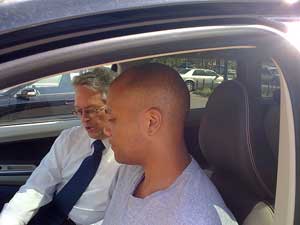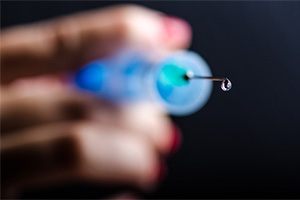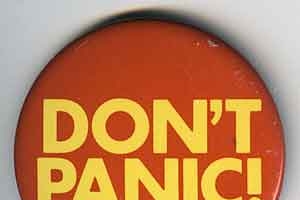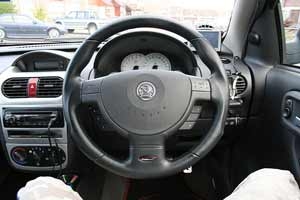How to Pass Your Driving Test
5 tips to the right mindset for passing your driving test
 "How to Pass Your Driving Test" courtesy of Ronald Lewis
"How to Pass Your Driving Test" courtesy of Ronald LewisI had expected to pass my driving test the first time, but as the little old lady dived out the way like a stunt extra from a Die Hard movie, doubt began to creep in. I swerved and she leapt, somersaulting down a grassy knoll (I exaggerate slightly).
Another 'mistake' on my first driving test was to drive the wrong side of a traffic bollard, and yet another was to drive straight for half a mile before remembering to switch my indicator off (because I was still in shock from seeing said old lady move so fast). Why was I driving so appallingly? Nerves.
The trouble was I was too keen to pass my first driving test. I cared too much. At seventeen I was desperate to be driving, to be independent. Working as a hypnotherapist over the years since then, I've helped dozens of nervous drivers relax and focus on their driving tests by sharing some of what I learnt about changing my mindset to help me pass the second time. Read on:
Prefer to watch instead?
1) Thinking you're going to pass your driving test isn't the same as passing it!
There's a lot of positive thinking nonsense which goes something like: "You've got to really believe you can pass your driving test, win a grand slam tennis tournament, write a Pulitzer Prize winning novel," and so on. No, no, no no no! Okay, let me qualify that.
It's great to believe that stuff some of the time, but...not when you are actually driving, playing tennis, or writing. Research into flow states (otherwise known as being 'in the zone') show there is less thinking going on during these states. Thinking of any kind (yes, even positive) will interrupt performance. (1)
During the flow state, the activity itself becomes intrinsically rewarding, which is why any thoughts of passing or failing become meaningless and counterproductive when you are actually in your driving test.
People come to me and ask: "Please help me pass my driving test!" I reframe this idea to: "I can help you relax during the test so that you don't have to think about passing or failure." Of course when you experience more flow during your test, then you are much more likely to pass as a by-product of being in the optimum driving state.
Don't think: "I must pass this driving test at all costs!" Rather, start to focus on: "How can I relax enough during the test that it doesn't even feel like one?"
Which leads us nicely on to the next tip.
2) Relax quickly just before your driving test
Part of the reason I failed my first driving test was because I was so nervous. But why should nerves get in the way of performance? I was good enough to pass but not relaxed enough to do well in the test.
Too much anxiety makes it harder to think clearly and also harder to make small dextrous movements. Because nature wants big, mighty movements from us in times of real danger (running, punching, pushing, and climbing), small delicate movements become much harder. This is why you might see someone's hands shaking when they are attempting to tie shoelaces or unscrew a bottle top while very anxious.
A bit of anxiety as you go into your driving test is good as it will get you focussed, but too much will prevent you driving as well as you should.
The quickest way to relax as you go into your test is to breathe deeply. But any old deep breathing isn't so effective; your out-breath needs to be longer than your in-breath. When we breathe out, we start to relax; similarly, when people panic, they just tend to breathe in. Take two minutes before your driving test to breathe in deeply, then breathe out slowly - so that you are breathing out for a longer time period. Do this 20 times to calm everything right down. Or, you can train yourself using our 7-11 breathing hypnosis download.
3) Get things in perspective
Remember, your driving test may seem really important (it seemed all important to me the first time), but it is really a very tiny part of life. Take a few minutes just before your test to reflect on how much trouble and strife there is in the world, how many people suffer, never experience drinking clean water, never have a roof over their heads or enough to eat. Tell yourself not to sweat the small stuff and, yes, whatever it seems like, this is small stuff.
4) Keep the pressure off by keeping it to yourself
Before driving test number one, I told everyone I knew about my upcoming vehicular examination - great! Now everyone was waiting for the 'news' - more pressure. Once the shock of almost prematurely assisting an elderly lady off this mortal coil had diminished, I distinctly recall thinking: "Oh no! How am I going to tell everyone I failed!" It's far better to surprise people with good news than to have to explain what went wrong, no matter how sympathetic people are.
5) Use mental rehearsal constructively
You've practiced driving, right? You've studied your road signs and know about three-point turns and reversing around corners and all the rest. The fact is, you've practiced how you're going to drive, but have you practiced how you're going to feel? Learn self-hypnosis to practice naturally feeling relaxed and in flow during the driving test. Remember, you can forget about passing or failing at this point.
But (important advice coming up!) don't visualize having passed your test. Leave the results of better performance to themselves. I want you to focus on your performance state during the actual driving itself.
Close your eyes and focus on your breath (remember to breathe out a little slower than you breathe in, extending that out-breath). Now imagine watching yourself as if on a TV looking calm, relaxed, and comfortable, yet alert and focussed, at the test centre; meeting the examiner; getting into the car; and taking the whole test - see yourself doing everything in just the right way, more focussed on the process of driving rather than any possible outcome.
My driving test II: The outcome
My second driving test was in the following spring - and this time around no one knew I was taking it. It was a beautiful morning and because I had learned self-hypnosis, I felt naturally relaxed and unconcerned with outcomes. I was here to enjoy the driving, nothing more.
I'm happy to say no old ladies were injured or even startled, bollards were negotiated correctly, and passing my driving test was just a happy bonus to a thoroughly pleasant morning.
References
- It's thought that some of the brain's 'pleasure centers' or 'reward systems' are activated during flow states but that rational cognitive thought and conscious planning is dampened down a little due to less activation of the prefrontal lobes of the brain (hence the feeling of being totally 'in the now'). See: Csikszentmihalyi, Mihaly (1997). 'Finding Flow'






